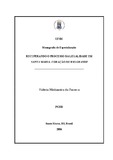| dc.contributor.advisor | Grunewaldt, Silvana | |
| dc.creator | Fonseca, Valéria Medianeira da | |
| dc.date.accessioned | 2019-04-01T15:23:33Z | |
| dc.date.available | 2019-04-01T15:23:33Z | |
| dc.date.issued | 2006-10-06 | |
| dc.date.submitted | 2006 | |
| dc.identifier.uri | http://repositorio.ufsm.br/handle/1/16029 | |
| dc.description | Monografia (especialização) - Universidade Federal de Santa Maria, Centro de Ciências Sociais e Humanas, Curso de Especialização em História do Brasil, RS, 2006. | por |
| dc.description.abstract | Brazil, in the beginning of its years 60, lived a situation of political instability when
after only seven months of government Jânio Quadros gave up his mandate. For the
Constitution, João Goulart, the vice, should assume the presidency automatically. However,
that was not the understanding of the military ministers, which tried to unseat Jango before
taking the power. Against that arbitrary attitude, he was formed a group that defended the
execution of the Constitution. At that moment, General Machado Lopes, the 3rd Army
commander joined to the current governor of Rio Grande do Sul, Leonel Brizola, who
captained the Campaign of the Legality, in Rio Grande do Sul, in defense of the Presidency of
Brazil by Jango. Therefore, this research turned on the Campaign of the Legality (1961) in
the municipal district of Santa Maria and it had as objective to analyze the events happened in
that City. In addition, it was attempted to show that the renouncement of Jânio, on August 25,
1961, caused great revolt and discomfort in several segments of the society especially among
the politicians and that the situation tended to get worse concerning the blow intention for the
military ministers. Starting from the attempt of impeding Jango of assuming the Presidency
of the Republic, great part of the population of the city was brought together with the
protected cause by Brizola and he had beginning so much a wide social agitation on the part
of politicians, military, civil people. A great part of the population has engaged with the cause
because they considered that legal and fair, specially in the University campus, where there
was a great commotion in support to the campaign. That study allowed to work with sources
of research places, tends as double interest, the valorization of the micro-history and the
importance of the municipal collections and the archivist’s. Moreover, the tie of the period in
study to the people who lived the peak of that conjuncture was made possible because of
documental sources which were used - newspapers, registrations preserved in files and also
oral sources that make possible the linkage between the studied period and the people that
lived the edge of the events. | eng |
| dc.language | por | por |
| dc.publisher | Universidade Federal de Santa Maria | por |
| dc.rights | Acesso Aberto | por |
| dc.rights | Attribution-NonCommercial-NoDerivatives 4.0 International | * |
| dc.rights.uri | http://creativecommons.org/licenses/by-nc-nd/4.0/ | * |
| dc.subject | Campanha da Legalidade | por |
| dc.subject | Santa Maria | por |
| dc.subject | Reação sociedade | por |
| dc.subject | Campaign of the Legality | eng |
| dc.subject | Reaction of society | eng |
| dc.title | Recuperando o processo da legalidade em Santa Maria: coração do Rio Grande | por |
| dc.title.alternative | Recovering process of the legality in Santa Maria: the heart of the state of Rio Grande do Sul | eng |
| dc.type | Trabalho de Conclusão de Curso de Especialização | por |
| dc.degree.local | Santa Maria, RS, Brasil | por |
| dc.degree.specialization | História do Brasil | por |
| dc.description.resumo | O Brasil, no início dos anos 60, vivia uma situação de instabilidade política, quando,
após apenas sete meses de governo, Jânio Quadros renunciou ao seu mandato. Pela
Constituição, João Goulart, o vice, deveria assumir a presidência automaticamente. No
entanto, esse não foi o entendimento dos ministros militares, os quais tentaram impedir Jango
de tomar posse. Contra essa atitude arbitrária formou-se um grupo que defendia o
cumprimento da Constituição. Nele, o general Machado Lopes, Comandante do III Exército
se uniu ao governador do Rio Grande do Sul, Leonel Brizola, que capitaneou a Campanha da
Legalidade, no Rio Grande do Sul, em defesa da posse de Jango à Presidência do Brasil. Esta
pesquisa versou sobre a Campanha da Legalidade (1961) no município de Santa Maria e teve
como objetivo analisar os acontecimentos ocorridos nessa cidade. Buscou-se mostrar que a
renúncia de Jânio, em 25 de agosto de 1961, causou grande revolta e mal estar em vários
segmentos da sociedade, especialmente, entre os políticos, e que, a situação tendeu a piorar
frente à intenção de golpe pelos ministros militares. A partir da tentativa de impedir Jango de
assumir a Presidência da República grande parte da população da cidade se solidarizou com a
causa defendida por Brizola e teve início uma ampla agitação social tanto por parte de
governantes, militares e civis. Grande parte da população se solidarizou com a causa por
considerar legal e justa, em especial na Cidade Universitária, onde ocorreu uma grande
mobilização de apoio à campanha. Esse estudo permitiu trabalhar com fontes de pesquisas
locais, tendo como duplo interesse, a valorização da micro-história e a importância dos
acervos municipais e do arquivista. Foram utilizadas fontes documentais arquivísticas –
jornais, registros preservados em arquivos e também fontes orais, que fez liames entre o
período em estudo com as pessoas que vivenciaram o auge daquela conjuntura. | por |
| dc.publisher.country | Brasil | por |
| dc.publisher.initials | UFSM | por |
| dc.subject.cnpq | CNPQ::CIENCIAS HUMANAS::HISTORIA | por |
| dc.publisher.unidade | Centro de Ciências Sociais e Humanas | por |



